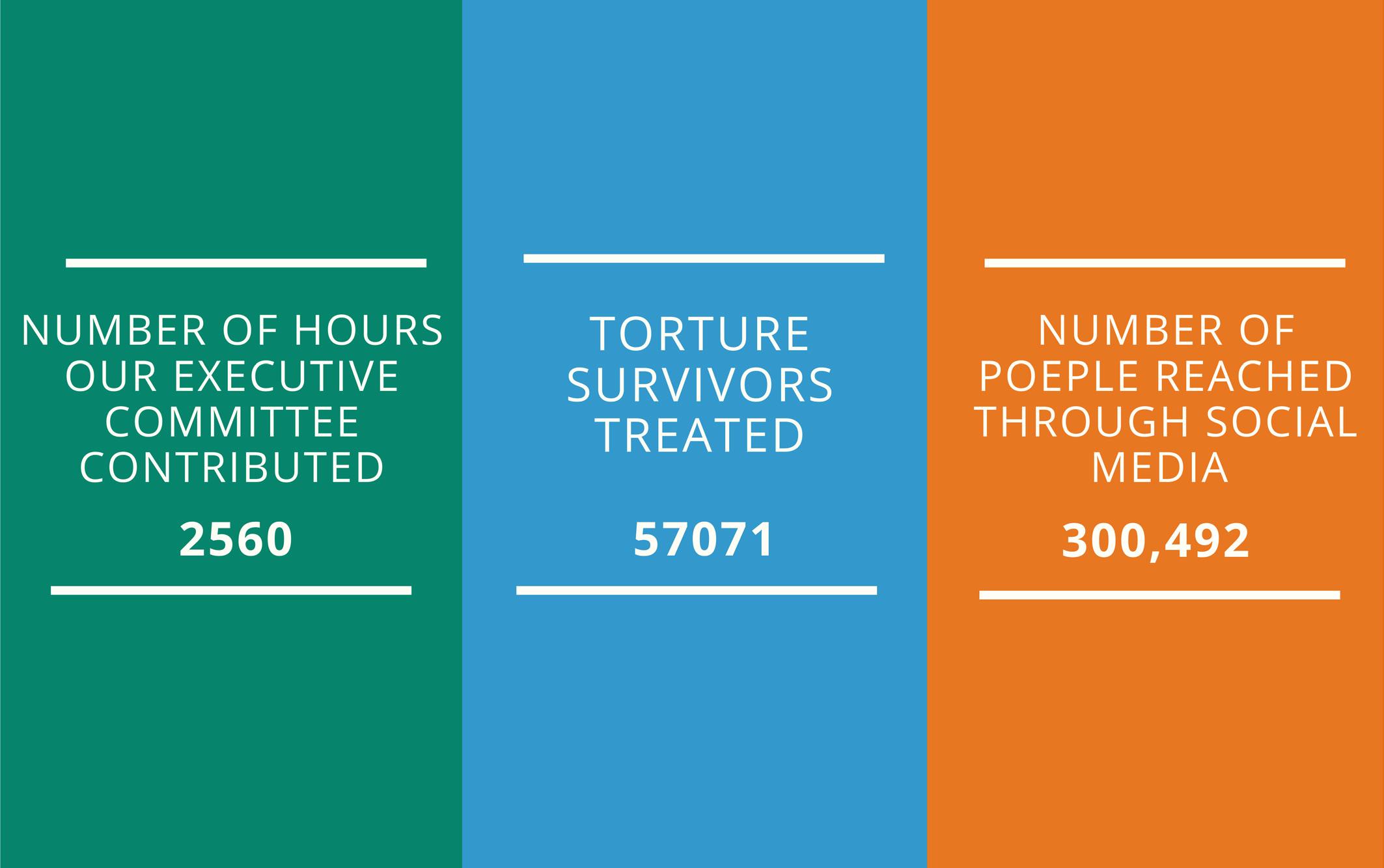
14 minute read
Welcome Message by Lisa Henry and Jorge Aroche
2019 was a year of change and achievements, not only for IRCT but for the entire global anti-torture movement. As ever before, thousands of torture survivors globally are seeking our health, legal and rehabilitation services; being the driving force behind our work and our inspiration. We continue the pledge to ensure that torture survivors drive our vision, shape our strategy and are represented in all walks of our work. The core values of IRCT only reaffirm this commitment: solidarity, equality and democracy—and by living by these values, these commitments are the core strength of our movement and is what makes our movement effective in fighting and eradicating torture across the globe.
Nelson Mandela’s quote, ‘No single person can liberate a country. You can only liberate a country if you act as a collective.’ can be translated directly to our global work to champion the Right To rehabilitation and Eradicate Torture. Therefore, our intense focus on cultivating and harnessing the power of our work and actions as a collective. Our collective actions to stand strongly behind the Right to Rehabilitation have shown results. From Asia, to Sub-Saharan Africa, the Middle East, North Africa, the Pacific, Latin America, Europe and North America our members have taken action and continued to prove how holistic rehabilitation for torture survivors not only works but is imperative for healing in torture survivors.
Advertisement
Armed with evidence- data collected through the IRCT Anti-torture Database- our members addressed national authorities in Uganda, for example, pressuring them to change legislation. During IRCT Istanbul Protocol trainings, members learned to conduct forensic examinations—being a vital voice for torture survivors in their journey for justice. Through our connections with the UN, our members, such as ITEI Bolivia, lobbied with the UPR to make clear anti-torture recommendations; showcasing how change grows out of a bottom-up approach.
We are very proud of the thousands of health and social workers at our member centres, who often risk their lives and expose themselves to dangerous environments, to reach thousands of clients. We know how you all are dealing with hostile environments and we commend your bravery and dedication. Across the world, values of tolerance and freedom are under threat. Proponents of torture are gaining the upper hand. They are taking to the helm of governments, even in democracies like the Philippines and the United States of America. Hearing the stories from your centres and the stories from the torture survivors you treat allowed IRCT to amplify your experiences on our communi
cation platforms—an endeavour we have increased in 2019 and will continue to do in the coming years.
Lisa Henry was appointed as Secretary General in late September 2019, following in the footsteps of Victor Madrigal-Borloz. Lisa Henry not only brings with her significant experience in leading non-profit organizational strategy and humanitarian/development response from her many years in the humanitarian sector. This helped Lisa to transition easily to continue the good work of the IRCT. She brings a strong vision and commitment to enhancing the credibility and strength of civil society organisations and harnessing the power of lived-experience and survivors involvement in the global anti-torture movement. In this short time, Lisa has already moved to put the IRCT vision of community into action by launching the new community of practice online platform fabo.org . There has been increased outreach to members, via phone calls, zoom and skype on their needs and expectations. The IRCT 2018-2021 strategy, including SDGs, has been relaunched to ensure collective action.
Our brave and loyal donors are integral to the IRCT. We deeply value your encouragement, your guidance, and your commitment to our common mission to eradicate torture and to bring survivors of torture to the forefront of the global agenda. None of this would be possible without your generous support.
We extend our heartfelt thanks and appreciation to all our staff, followers, members, volunteers, partners, allies and above all—the torture survivors who entrust us with their cause.
Lisa Henry
IRCT Secretary-General
Jorge Aroche
IRCT President
IRCT Member Centres Across The Globe
158 members in 75 countries came together in unity to share our objective to improve quality of life for survivors of torture worldwide.
158 members worldwide 19 members in Asia 57 members in Europe 10 members in Latin America & the Caribbean 16 members in MENA 23 members in North America 11 members in the Pacific 22 members in Sub Saharan Africa
2019 in Numbers

How IRCT makes a difference
IRCT is the world’s largest membership-based civil society organisation working in the field of torture rehabilitation with 158 member centres based in 75 countries.
We are a global movement that responds to and represents the rehabilitation needs of torture survivors, their families, and their communities. Our members work in a wide range of contexts, including some of the most repressive and conflict driven regimes in the world. Our work is health-based and informed by the provision of rehabilitation services. It draws on four decades of worldwide accumulated experience and collective knowledge on the physical, psychological, and social effects tor
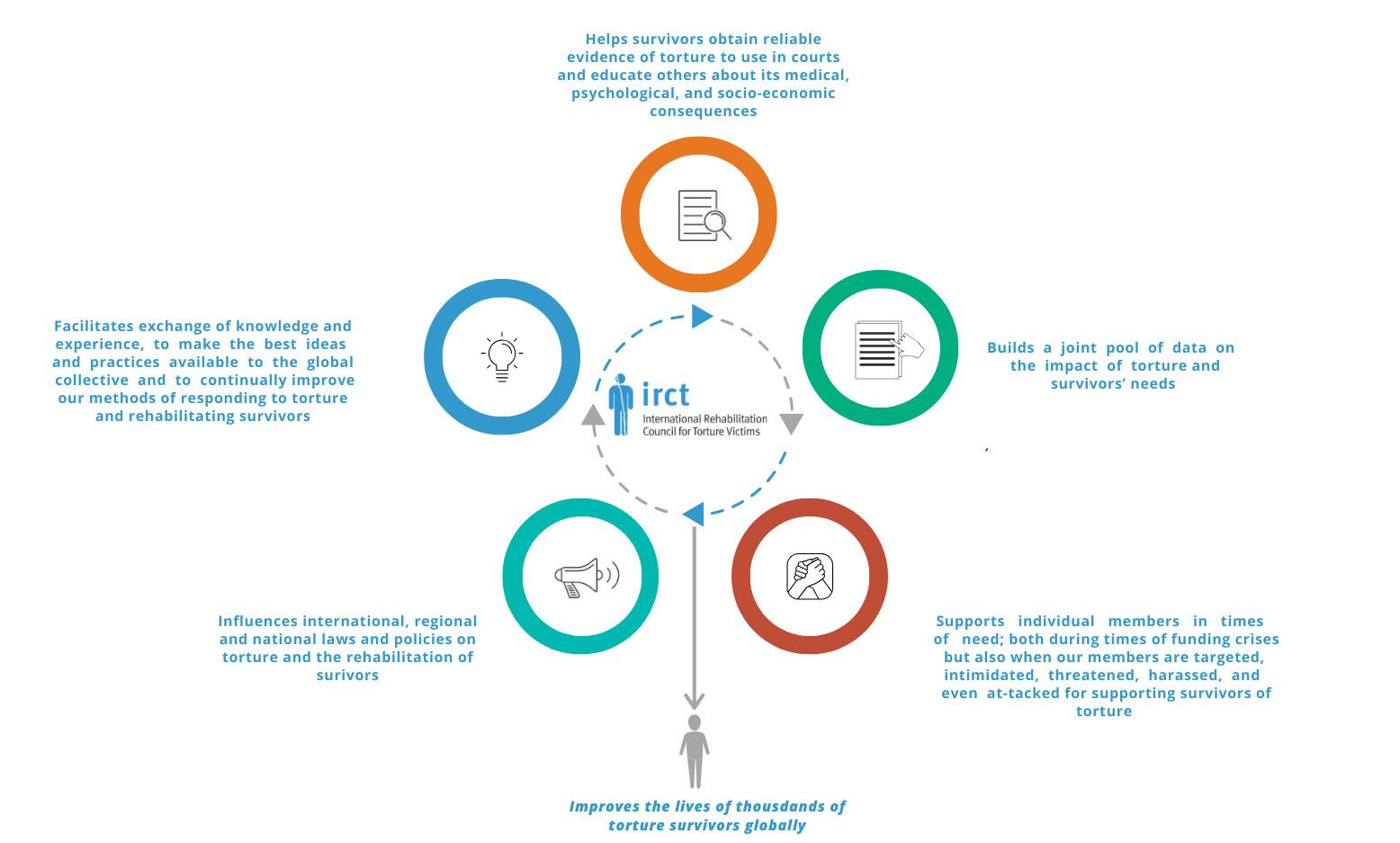
ture has on survivors of torture and on how to support survivors’ lives after torture. It is from this unique perspective that we contribute to advancing the three pillars of the global fight against torture: prevention, accountability, and redress. Our work is greatly driven by the hundreds of volunteers and specialists doing exceptional pro-bono work. Their contribution does not only increase our capacity to conduct in-depth research and analysis, they also contribute to evidencing the use of torture worldwide and how we as actors best can use this knowledge in advocating for the rights of survivors of torture. In addition, much of our funding comes from generous grants from our partners and donors.
New IRCT Strategy 2018-2021
The IRCT Strategy runs to 2021 and contains the 4 SDG’s that our work relates to:
Number of Survivors of Torture that Received Treatment per Region
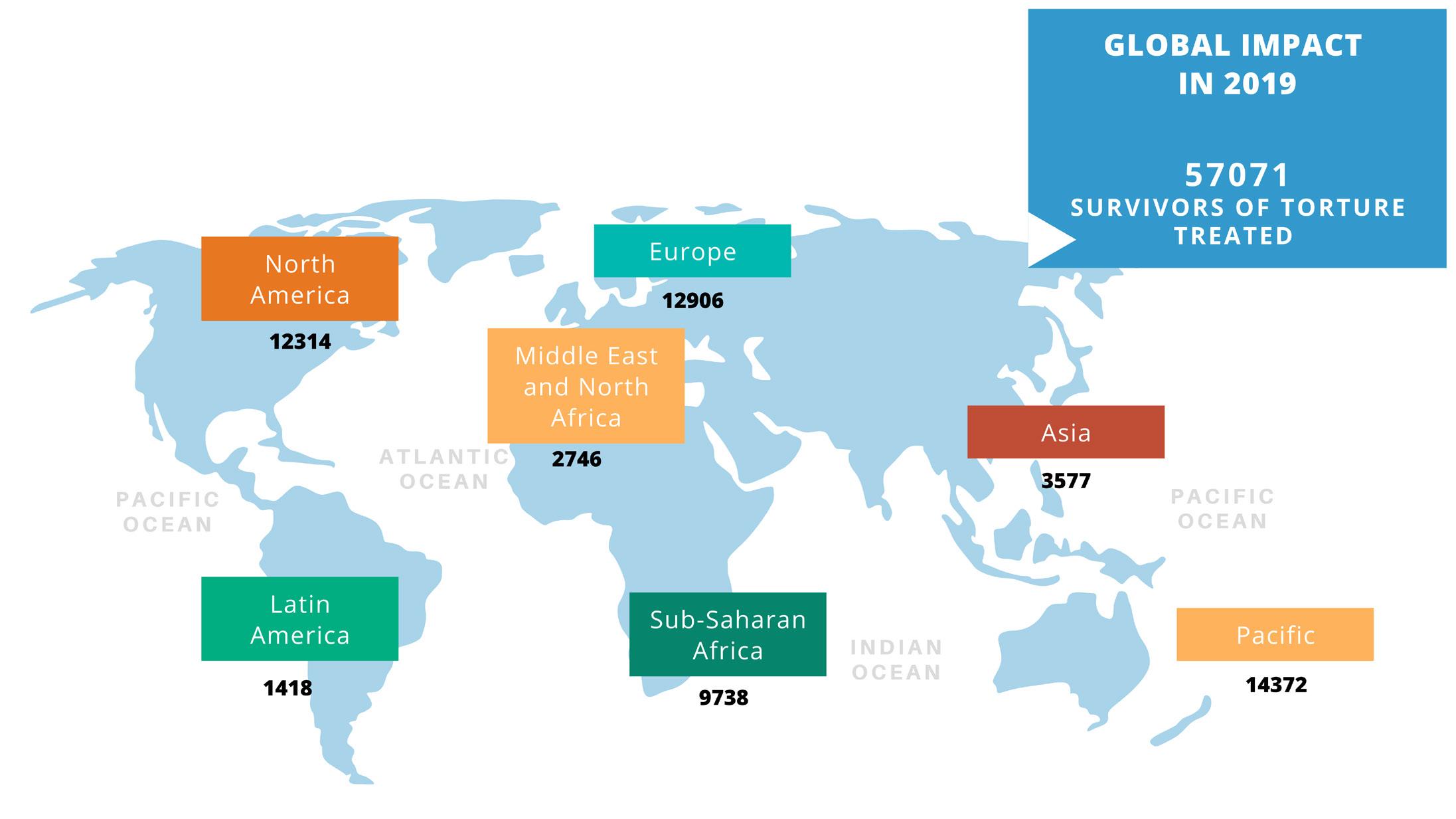
Survivor story from CVT in Jordan
“Because of events in Syria, we were deported. We lost loved ones—I lost three brothers. It was complete destruction. When we got to Jordan, I felt very bad. I stayed in bed, angry, sad and crying. I was isolated from everyone. A friend told me about CVT—she knew that after my brothers died, I was very down, very low. She said “Why not give it a try? It’s a good place.”
So, I came to CVT and I saw the care. I saw the respect they gave. I saw how much they cared for me. I loved the women in my group. They treated me well, and I was able to meet new people.
It’s amazing to feel good.
CVT took the negativity out of my head. Psychosocial support and physiotherapy made me feel better on the inside. Now I feel worthy in society and that there are people who care about me and about my comfort. They listened to me like a second mother.
I was counting the hours and minutes until my next session started. I wanted the sessions to go on forever. Then I advised my two children to come. They were 10 and 12 years old and were afraid of appearing like beggars coming here. But I said it’s not financial support—I told them they’ll feel better. They felt happy since the first time they came to CVT. They felt safe here. We were all sad, in pain. Before coming to CVT, they were isolated and had a lot of negativity. They didn’t want to make friends. But they came here and saw people who cared. Psychosocial care and physiotherapy for my children was very effective. They became comfortable. They were able to speak and empty their hearts. Since CVT they have confidence.
The counselors told my children: You are a human being, you have to live. You have a future.
At CVT I saw there are people who care about me more than I was used to. More than my mother, husband, children. Today I am more confident. I feel I’m not alone, and my problems are not as bad as others’. I was introduced to a huge community—all because of CVT— I only met them here.
I have all respect for CVT—they know how to hand-pick employees. And I want to say thank you to the donors of CVT. For refugees, support is not only financial—the psychological support is more important.”
Name and some details have been changed for safety and to protect confidentiality.
Photo credit: Dreamstime Story credit: IRCT member CVT Jordan


Overview of our work
Fundraising statement
IRCT’s work is financed by several donors. While the need for torture rehabilitation and health services, training and advocacy is growing, resources are becoming increasingly scarce. This requires us to find ways to leverage the collective strength of broader donor segments. Thus, our efforts in leveraging income needs resulted in a diversification of our funding in 2019. We strengthened our funding position and capacity which ensured funding to the broader rehabilitation sector.
Given this situation, it is gratifying that we secured a new core funding partnership with Sigrid Rausing Trust. We also saw an increase of membership contributions to our core activities. Further, we are grateful for receiving a new core grant from the Hilton Foundation. The diversification includes a new fundraising plan, a new fundraising expert and a financial sustainable business model.
The IRCT Council did a rigorous review and change of the IRCT Statues to encourage an introduction of membership fees. We developed a new fee structure after research into models used by similar organisations. Seeing how this model not only fosters solidarity in membership organisations, it inspired us to include this in our funding strategy - to leverage and diversify our funding streams. We look forward to collaborating with our members through this structure. Their ownership in the IRCT movement will be amplified through their financial contributions. In 2019, we advocated with the EU to have rehabilitation services in its global anti-torture finding as a specific activity. In addition, an initiative was started together with the Center for Victims of Torture (CVT) to increase the funding for rehabilitation distributed through the UN Voluntary Fund for Victims of Torture (UNVFVT).
Increased engagement with, and between members
We contribute with a wealth of knowledge in the anti-torture sector. With 158 members across 75 countries we have a powerful voice and a useful vantage point. Being diverse in our members we offer the anti-torture movement a unique expertise and peer-to-peer po
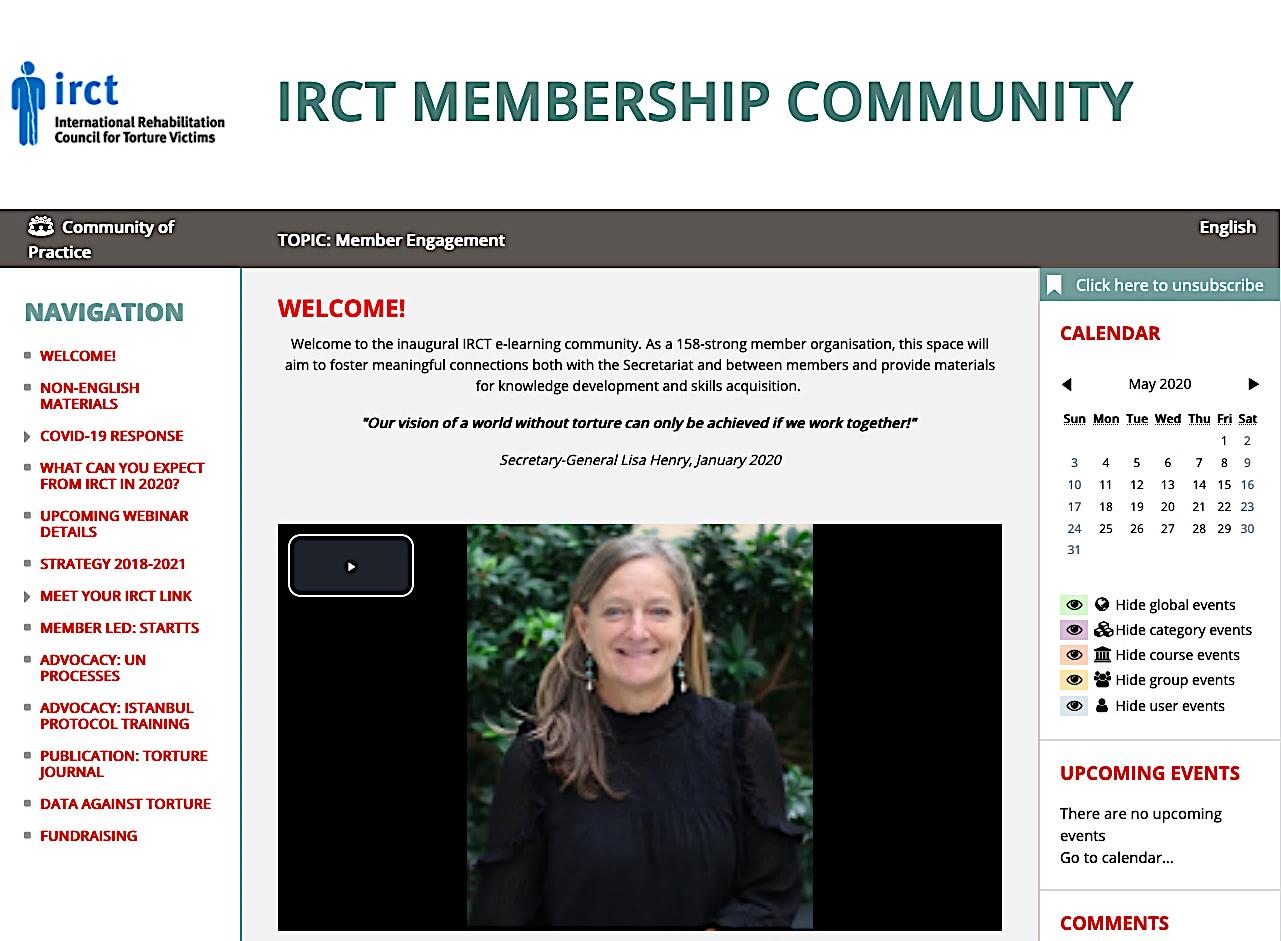
tential. We want to increase this potential and expertise by scaling, connecting, and amplifying the invaluable knowledge our members. 2019 was the year where we did exactly this.
We analysed patterns of engagement, examined historical successes, challenges and we
strategized. Based on this research, we developed a 6-month plan for engaging members in the IRCT movement. This short-term engagement plan will ultimately inform a long-term approach for engagement in 2020 and onward. The engagement plan provides a clear structure for membership roles and responsibilities. The IRCT 2018-2021 Strategy plays a significant part of the plan, encouraging members to relate to the strategy in their work (such as the UN SDG’s). To promote the new strategy, IRCT has entered a partnership with DanChurchAid, a Danish organisation, to offer our members a platform for learning about the new strategy. The interactive learning site is called “Fabo.org” and is an opportunity for skills acquisition and increased interaction with IRCT members. To amplify the rights of torture survivors and to increase peer-to-peer exchange we have entered into this partnership with DanChurchAid to develop an online platform for our members. The platform encourages knowledge sharing and dissemination of lessons and tools from the centres but also fosters interactive learning. Most importantly for us, the platform will provide the IRCT secretariat a collaborative space to bond the IRCT membership and to receive news from centers, alerts from the field, and stories from torture survivors. We have already seen great enthusiasm in the membership to utilise the learning platform and we look forward to many discussions, webinars and engagement in 2020.
As a global membership organization with members representing all regions of the world, we have increased all communication channels in 2019, hereunder our social media platforms and website performance. Communications is imperative for us to reach torture survivors and to not only listen, but to communicate their stories and to learn from their caregivers.
The governing body of IRCT has reviewed and updated the membership criteria. The criteria now include revised accountability guidelines and mechanisms to address non-compliance.
The engagement plan included a mapping of competencies and competencies available outside of the membership. This, for example, includes partnerships with other organisations and research institutions. Online connectivity naturally plays a big part of our movement and thus in the engagement plan, so we have enhanced the IRCT’s membership IT platform. The new IT platform caters for the members needs and provides an easy and accessible overview of data coming from our members.
Scientific Symposium 2020
Plans for the Scientific Symposium were well underway in 2019. With a Scientific Committee of 12 members and a cooperation agreement with our centre in GCRT Georgia and Illa University in Tbilisi, we had already established the theme for the Symposium: “Overcoming the Extreme Life After Torture”. Proposals for workshops, speakers and calls on member centres to contribute with voluntary funds to finance logistical costs have been established. Expressions of interest from six people were recorded for the establishment of an Organizing Committee. A fundraising mission to Georgia was conducted in October 2019 with 20 fundraising meetings at international organisations, embassies and we were invited to submit four applications.
The symposium has been postponed to the fall 2021 due to the pandemic COVID-19. The General Assembly will be held virtually as planned in October 2020.
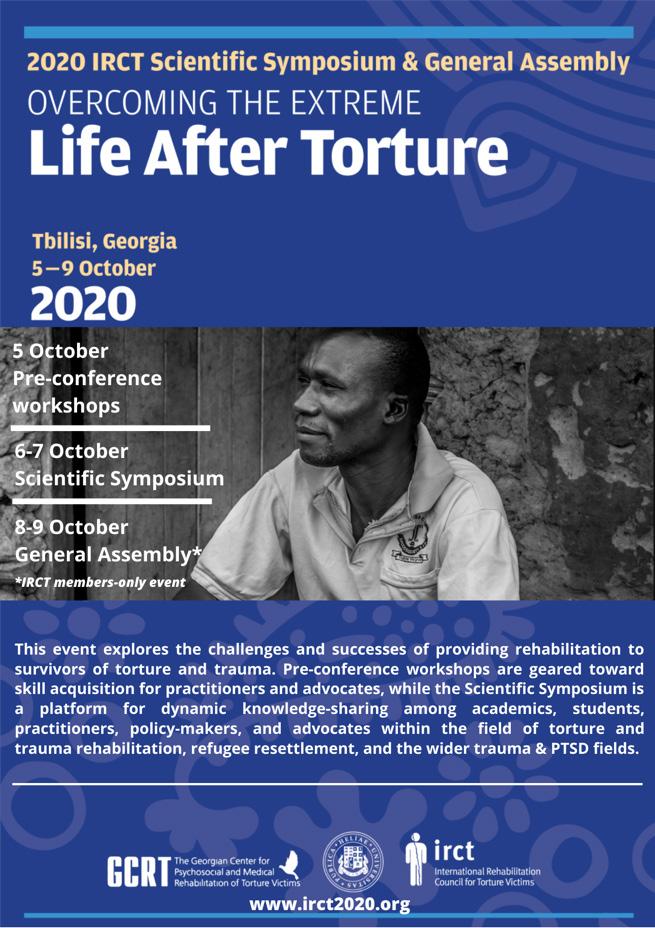
The flyer for the 2020 Symposium which was Postponed to Sept. 2021 due to COVID19.
"The scientific symposium provides a unique opportunity for our movement to come together and showcase the fascinating work individual centers are doing, share latest research and clinical innovations, discuss the best practices and challenges of the collective. Teaming up with Ilia State University for the symposium is an important step for mainstreaming the work of anti-torture movement in the academic field. We very much hope to have the opportunity to host the symposium in 2021."
Documenting Our Impact
In 2019, we completed all elements of the projectisation of our strategy and the accompanying internal monitoring and evaluation system. This has generated useful learning, which reflects in our projects and programmes. To further enhance our capacity to deliver impact with limited resources, we have continued the process of engaging members as project implementers and owners. This increases efficiency and effectiveness in our work to influence UN and EU policy setting and human rights monitoring processes such as the UPR, UNCAT State reviews and EU Hu

man Rights Dialogues. It has resulted in successful use of peer-to-peer methodologies in projects and enhanced member ownership of the planning and implementation of the IRCT General Assembly in October 2020 and the Scientific Symposium, which will take place in 2021. To anchor all these initiatives and ensure effective documentation and reporting of impact in our enhanced implementation structure, the IRCT established the position of and recruited an M&E and Communications focal point who started the post in September 2019.
The IRCT currently tracks how many survivors of torture are supported by our members to help them achieve better quality of life. In 2019, our membership made a positive impact in the lives of more than 57.071 torture survivors. In measuring impact on social change, we currently use a system based on output and outcome indicators on human rights and democracy issues.
Looking forward
The next step in our impact measurement is composed of two components that are currently in development. In order to provide detailed health data on our impact on quality of life, the IRCT membership is in the process of adopting a definition of quality of life that captures the needs of torture survivors and is globally applicable and measurable. This
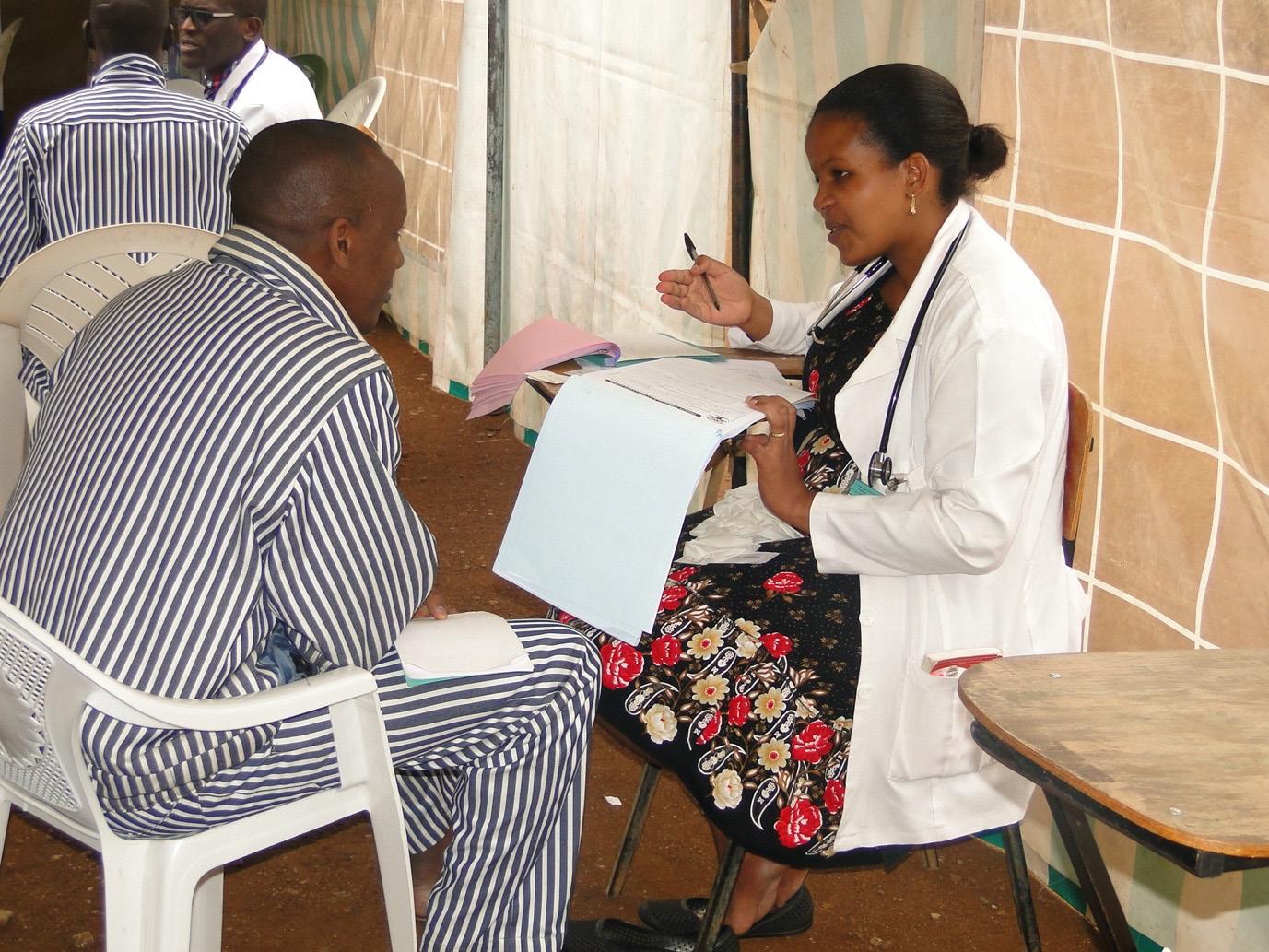
process, which is composed of both technical and political consultations, is expected to be finalised at the IRCT General Assembly in October 2020. Once adopted, it will enable all members to document and share more detailed information about their positive impact on torture survivors’ lives globally and connect this to the SDGs. In relation to our impact on social change, we are developing methods for monitoring, documenting, and learning from the wider and more long-term impact of, for example, our advocacy efforts and cases. The preliminary methods and approaches have been developed in 2019 and are now being tested on elements of the IRCT’s advocacy programme. Next steps will be informed by learning from this experience.









